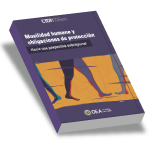- English
- Español
Rapporteurship on Human Mobility
Over the years, the IACHR has monitored the situation of people in the context of human mobility through visits, thematic and country reports, requests for information, public hearings, and working meetings. In order to guarantee the recognition of these persons as subjects of law and to ensure the effective enjoyment of their human rights, the IACHR has also focused its actions on ensuring that victims of violations have equal access to international justice. This is done through the mechanisms for individual cases and precautionary measures provided for by the Inter-American Human Rights System. In addition, it has promoted the development of jurisprudence and advisory opinions that have been issued in relation to this group of people.
In 1996, the IACHR created the Rapporteurship on Internally Displaced Persons and the Rapporteurship on Migrant Workers and Members of Their Families because of the serious situation of internally displaced persons and migrants and their families in countries of the Americas. Although the creation of these rapporteurships served to provide greater attention and visibility to the human rights of these groups in vulnerable situations, the protection and promotion of the human rights of other groups of people in the context of human mobility continued to be one of the main focuses of the IACHR's work since the beginning. For example, the phenomenon of the international displacement of hundreds of thousands of people who had to flee or leave their countries as a result of the dictatorships and armed conflicts that occurred in the region in the twentieth century, and to request international protection, has been monitored.
In 2012, the IACHR modified the mandate of the Rapporteurship to respond to the multiplicity of challenges posed by human mobility in the region, whether international or internal, migration, or forced displacement. The new mandate focuses on respecting and guaranteeing the rights of migrants and their families, asylum seekers, refugees, stateless persons, victims of human trafficking, internally displaced persons, as well as other groups of people at risk in the context of human mobility.
In recent years, the IACHR has decided to change the name of the Rapporteurship to the Rapporteurship on Human Mobility in order to strengthen the broad scope of its mandate.
Commissioner

Andrea Pochak
Rapporteur on Human Mobility





